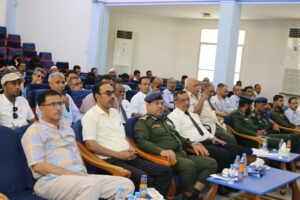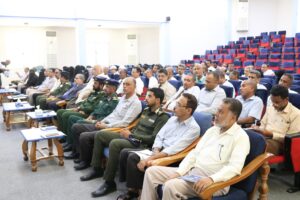A discussion workshop on the evaluation of exam papers for the university’s colleges was held under the patronage and attendance of Prof. Mohamed Saeed Khanbash, President of the University, the Vice Presidents of the University, and the General Director of the Academic Development and Quality Assurance Center at the University, Prof. Abdullah Eidh Baheshwan.

The Academic Development and Quality Assurance Center, the deans of the colleges, their deputies, and several representatives of relevant entities held a discussion workshop in the Ali Ahmed Bakathir hall at the University Presidency on the topic of “Evaluation of Exam Papers for the University’s Colleges” yesterday, Tuesday, May 28, 2024.
After serious deliberations and discussions by the attendees, and after considering the various visions and the desired results to achieve the goals and objectives, the workshop came out with the following recommendations:
- Submit periodic reports to the university presidency and deans of the colleges that include the most important strengths and weaknesses of the final exams to determine the workshops and training courses necessary to improve the skills of staff members.
- Provide feedback to staff members on the quality of their questions and tests and their psychometric properties, and train them on how to prepare exams in light of the specifications.
- Organize training courses for staff members on how to prepare exam questions.
- Continuous training for staff members and providing technical support and specialized electronic programs to prepare good exams free from measurement types and develop types of questions that aim to measure higher skills and rely on rubrics in correction to ensure quality.
- Train staff members on how to prepare a measurement plan for the learning outcomes of the course to ensure that the exams cover the learning outcomes.
- Train staff members on how to formulate questions that allow students to use higher-order thinking skills.
- Continuous review to evaluate the achievement of learning outcomes at the program, college, and university level with the building of improvement plans.
- Develop a mechanism to review exams and verify that they meet the conditions for their construction and comprehensiveness of the learning outcomes of the courses.
The leadership of the Center for Academic Development and Quality Assurance had submitted their proposals for the formation of the committee for the evaluation of final exams in the colleges to Prof. Mohamed Saeed Khanbash, President of the University, in a letter that stated:
Based on the decision of the University President to form the Higher Committee for the Evaluation of Bachelor’s Degree Exams for Students in the Colleges of Applied Sciences (6 colleges) and the extent to which they achieve the targeted learning outcomes for the period from 2017-2018 to 2021-2022.
We propose the formation of committees at the level of the colleges according to the internal quality system as follows:
- Prof. Mohamed Saeed Khanbash: President
- Prof. Abdullah Saleh Babair: Vice President
- Prof. Salem Mubarak Al-Obathani: Member
- Prof. Abdullah Eidha Baheshwan: Member
- Dr. Shawqi Ahmed Al Dais: Member
Responsibilities:
- Conduct evaluation studies to verify:
- a) The level of student satisfaction with the evaluation and examination processes they are subjected to during their studies at the university.
- b) The validity of the exam paper in light of the standard criteria and specifications from a formal and technical point of view.
- c) The ability of the final achievement exams to measure the targeted learning outcomes of the academic courses.
- d) The validity of the psychometric indicators for the final achievement exams

Prof. Abdullah Eidha Baheshwan, General Director of the Center for Academic Development and Quality Assurance, described the outcomes of the discussion workshop as fruitful and yielding positive initial results. He expressed hope that these outcomes will be implemented in practice in the colleges with enthusiasm and competence to reach new horizons, a better future, and more coherent and compatible outcomes with the labor market, serving the goals of sustainable development and achieving the university’s goal of being in service to the community.


